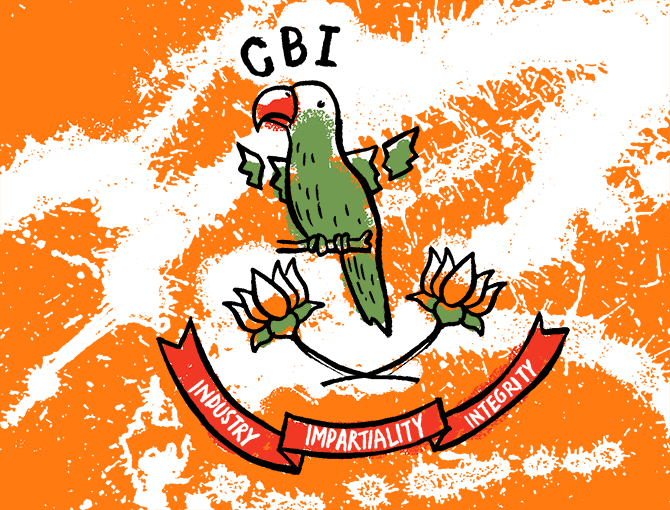 | « Back to article | Print this article |
'The CBI must become a creature of the Constitution,' argues T C A Srinivasa-Raghavan.

Now that the rot Indira Gandhi introduced into government in the mid-1970s has begun to suppurate in the form of the open festering in the CBI, we will hear a lot of wailing about the degeneration of 'institutions'. Often, however, many people have only a vague notion of what the term 'institutions' means.
So it is worth reminding everyone that an 'institution' is not a building. Nor is it an office. It is also not something that is instantly created. It is also not something available for duty-free import. Indeed, there are many things that it is not.
It is, instead, a set of rules created over a long period of time to give effect to a set of values that evolve gradually to enable control.
So whether it is the khap panchayats or the rules that govern entry into temples or those which govern the relations between governments and central banks or between the police and everyone else or whatever, two things are important for a genuine institution to emerge: Gradual evolution and the strict administering of rules.
But here's the problem: In a winner-takes-all electoral democracy, there is no time for gradualism so that the rules never settle down.
As we have seen in the post-Indira Gandhi era, one government's rule becomes another's misrule.
There are two ways in which these allegations of misrule appear justified to many people. One is when a government becomes paranoid and panicky, upon which it starts making mistakes. The other, as result, is when a government puts loyalty to itself -- meaning the prime minister -- above loyalty to rules.
The loyalty test
Indira Gandhi went down this road when she adopted what I call the 'Sanjay-Dhawan imperative'. It was that in order to hold a top executive position in the central government, it was necessary, but not sufficient, to be a Punjabi, preferably Khatri.
R K Dhawan proposed and Sanjay Gandhi approved. You can look up the postings history of 1974-1976 to check this. If I may illustrate the point, ceteris paribus, a Nayyar was preferred to a Nair.
It is easy to draw the wrong conclusions from this sort of thing. But, in fact, it was no more than the replacement of a British practice or institution with an American one where loyalty to the leader is the key determining factor.
And, in turn, this is the result of the need to deliver quick results, which can often be delayed if the existing rules slow things down. It's the old 'pesky priest' problem.
Lest you think I am justifying the flouting of rules and laws, this is not my view. It was the view of Chief Justice P B Gajendragadkar, who said while governments were in a hurry, the judiciary had to see that things were done properly.
The ensuing friction is-- if I may be permitted Justice V R Krishna Iyer type hyperbole -- the music of democracy. There's no need to get your knickers in a twist over it.
That said, a problem nevertheless remains when you describe something that has been created by an administrative order as an 'institution'. The CBI is one such. It owes its existence to a home ministry resolution.
That is why, in 2013, the Gauhati high court held that it was illegal. Since then the matter has been in the Supreme Court.
But even if it overturns the Gauhati judgment, the CBI will not become an institution. For that to happen, it must satisfy the following two criteria.
First, it must become a creature of the Constitution. These institutions are Tier One institutions and the only ones that are truly independent of governments. The Tier Two ones, created by Parliament, are semi-independent and the Tier Three ones, created by ministries, are just extensions.
Second, like the other institutions created by the Constitution do, it must have its own staff. It just won't do to staff it with police officers on deputation. Even when they don't come with suspect credentials, the approach is not what an independent investigation agency needs.
The rest, including the power and procedure of appointment of directors, and their removal, is a matter of detail. Besides, to a large extent the current system has taken care of this.
It's unlikely that any of this will happen soon. But the current crisis offers Prime Minister Narendra Damodardas Modi an opportunity to test the Opposition: Will it agree to the CBI being made a Constitution-mandated body?
If nothing else, to deflate Opposition, Mr Modi should at least float the idea.